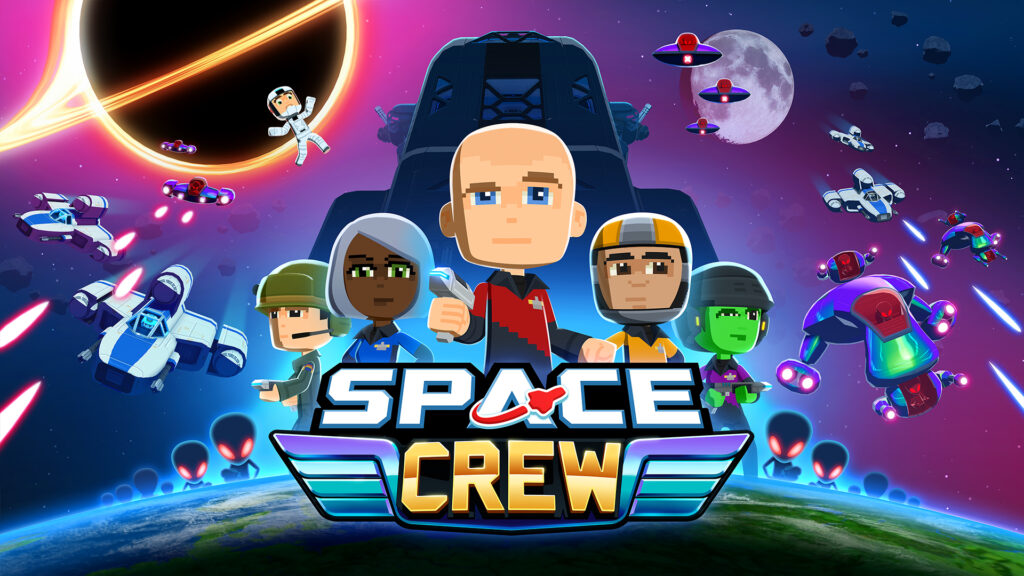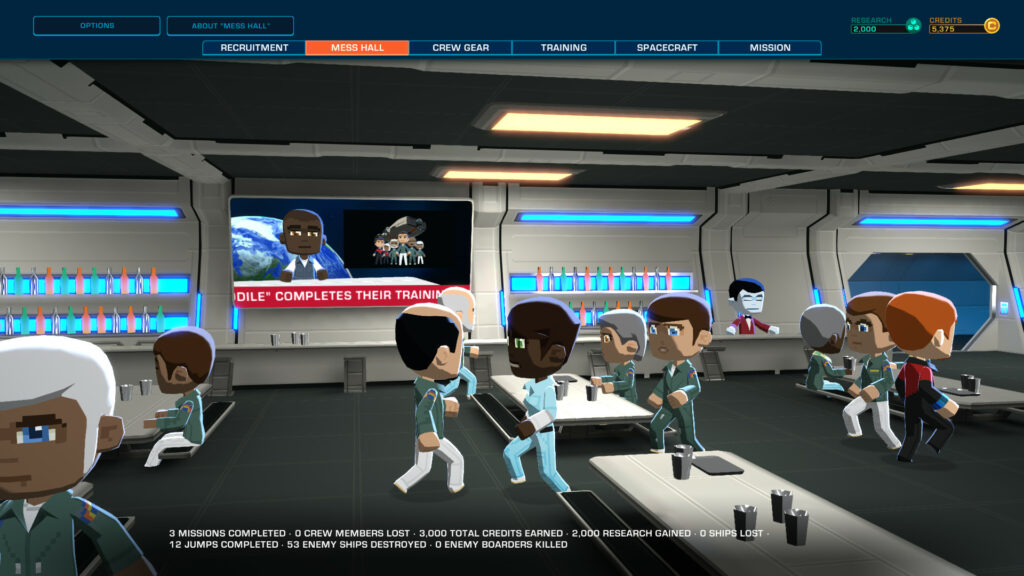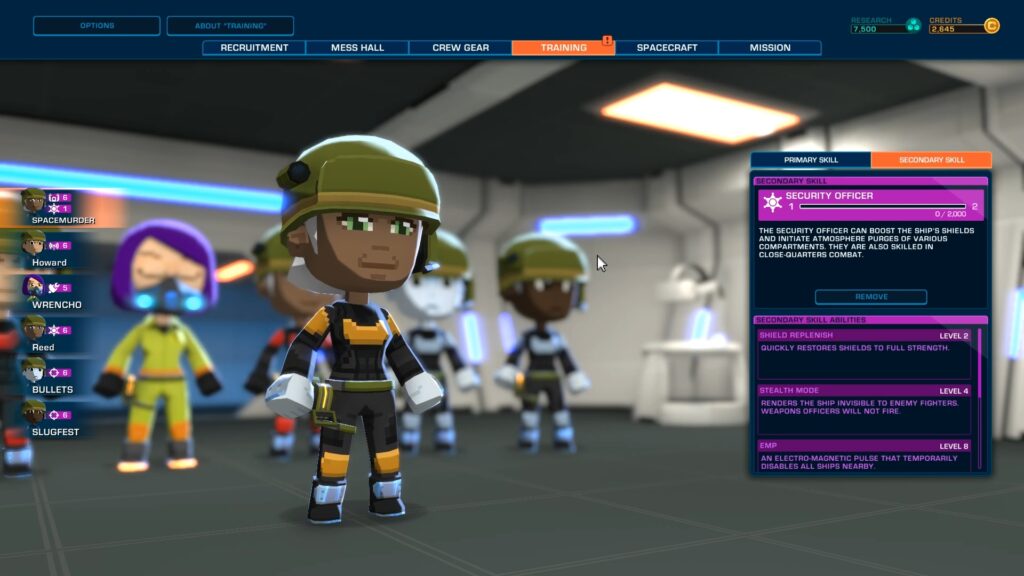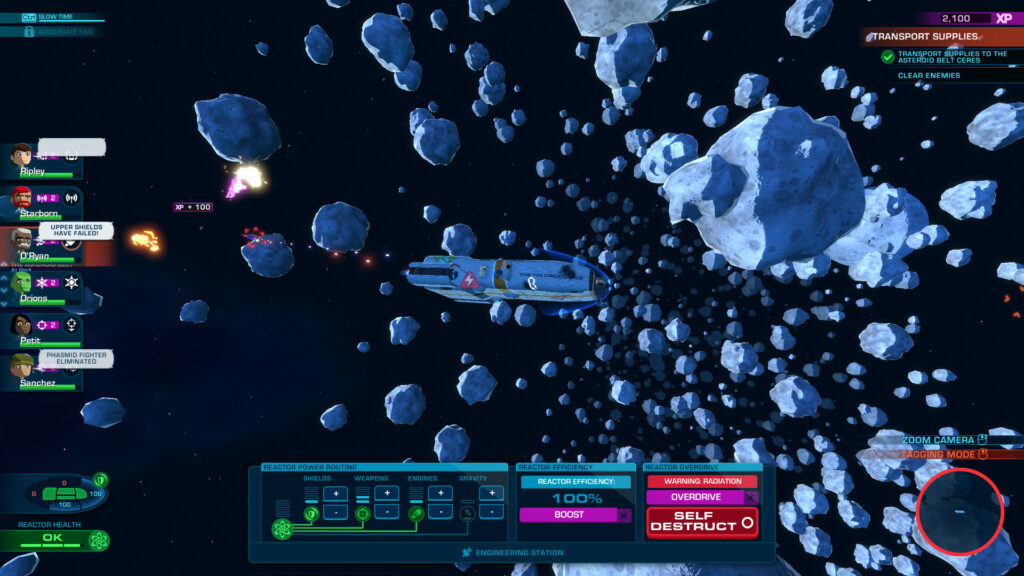
Developer: Runner Duck
Publisher: Curve Digital
Platform: PC, Nintendo Switch, Xbox One, PlayStation
Tested On: PC
Space Crew – Review
Space Crew is a direct sequel to the popular title Bomber Crew, published by Curve Digital. With the latter somewhat being a World War 2 ‘simulator’, Space Crew uses the same formula in a more futuristic setting, blending space combat, simulation, and roguelike elements. The game does suffer from the same issues as the first title but is still enjoyable nonetheless.
Story
Similar to Bomber Crew, Space Crew doesn’t really have much to deliver in this aspect. From the start of the game, players are introduced to the ship’s crewmates and captain, who are all fully customizable in terms of appearance. Being a part of the United Defense Force, it’s their responsibility to defend Earth from invaders and primarily the “Phasmids”; a dangerous group of extraterrestrial beings hell-bent on taking over the planet.
As stated above, the game offers little to no content as its backstory, which is a small disappointment. In comparison to Bomber Crew, since this is a direct sequel with a completely different setting, the thought of the title having an actual story was very much expected, but sadly Space Crew failed to deliver. Players will have certain choices to make in certain parts of the campaign, but nothing too much to change the story from its base course.
Graphics
Space Crew is a beautiful game, when it wants to be. For the majority of the game, the graphics are mainly focused on the planets and ships players will encounter. Since the game is focused on space travel, players will expect to find numerous different planets, each with its own unique traits. The planets are vibrant and have many different features, like being surrounded by asteroid fields and having multiple moons. While the planets are varied enough to be considered different, it can also be described as a palette swap of planets seen a few hours earlier.
This is a common occurrence with enemies also. The enemy types are varied enough to not be considered monotone in comparison to other titles, but the majority of the time the new enemies players encounter are just the same with different colors. All things considered, this is not a serious issue, but it can become something quite bland and boring after a while.
Sound
In terms of sound, Space Crew is a mixed bag. At certain times in-game, the music is fantastic, delivering grand scores when fighting multiple enemies in battle. Regrettably, at other times when players expect a certain type of song to fit the setting, it doesn’t really deliver. In spite of that, the music does its job well when needed, and the same can be said for the sound effects.
When defending your ship from enemies or triggering boosts when traveling from place to place, each sounds equally satisfying in unison. The sounds of laser artillery hitting the ship’s shields are heavy and muffled, the explosions from enemy ships are loud and bombastic, and even the subtle ambiance of space travel fits the mood perfectly. Space Crew does a great job of making each sound distinct, but sadly the game offers no voice acting; aside from the few muffles players will hear on the speaker when conversing with teammates, which can be annoying to hear at certain times.
Gameplay
Space Crew is a space-faring strategy/simulation game with roguelike elements. Rather than having a linear path through levels, the game tasks the player to do various missions, with the goal of upgrading your ship and crew. The missions are varied, but more or less have the same structure. Delivery and Rescue assignments are the bread and butter for most jobs, with a few special missions here and there. Needless to say, since the game doesn’t offer much on story, the mission structure can get repetitive and stale easily, making the overall experience more grindy than usual.
In order to progress, management and strategy are the primary elements in Space Crew and are the most enjoyable. When traveling, players are given the option to recruit up to six crewmates, each with their own individual traits and ship roles. The ship has different seating locations for crewmates, depending on placement and special commands can be used for each area. Sadly, things aren’t as simple when slotting certain characters. There are two extra spaces for weapons, which means players will have to pick which crewmate is good for the job at hand, requiring a hefty amount of planning and resource management.
As this makes the game more challenging, it has a few drawbacks, especially during combat. Instead of manually targeting enemy ships, players will have to slot crewmates to handle the job instead; which is fine if the player has the option to pause the game and issue commands, a common trait in other sim games. Sadly in Space Crew, that is not a possibility. When certain fights get overly hectic, various issues will occur, such as shield depletion, oxygen tanks bursting, and damaged materials that are necessary to be fixed before continuing.
Since certain crewmates are better in certain areas, players will have to relentlessly go back and forth between them. This can make fights overbearing in certain parts, considering there are not enough crewmates to handle issues when they arise, making the game more difficult than it has to be. There is the option to slow down time and issue commands that way, but as the ship and crew can still take damage during the slowdown, this means that players will still have little to no breathing room to plan out strategies mid-battle; turning the game into Overcooked In Space.
After players complete missions, the crew is rewarded with research points and money, for unlocking new gear and upgrades for the ship, as well as leveling up any surviving crewmates. As mentioned earlier, the game borrows some roguelike elements, meaning if a crewmate dies, they’re gone for good. Players can always recruit more members, but at the cost of the crew being unbalanced, making the game even more of a hassle, especially in later missions. Overall the upgrading system is well implemented, and the game does a good job of balancing experience and resources.
Conclusion
Space Crew is an enjoyable game in short bursts. The game has some spectacular moments, especially when traversing through different systems. Despite the game having a grindy mission structure, and combat sequences being overly hectic at times, the game is still fun, especially when the player has time to work out strategies.
Space Crew - Review,









No Comments